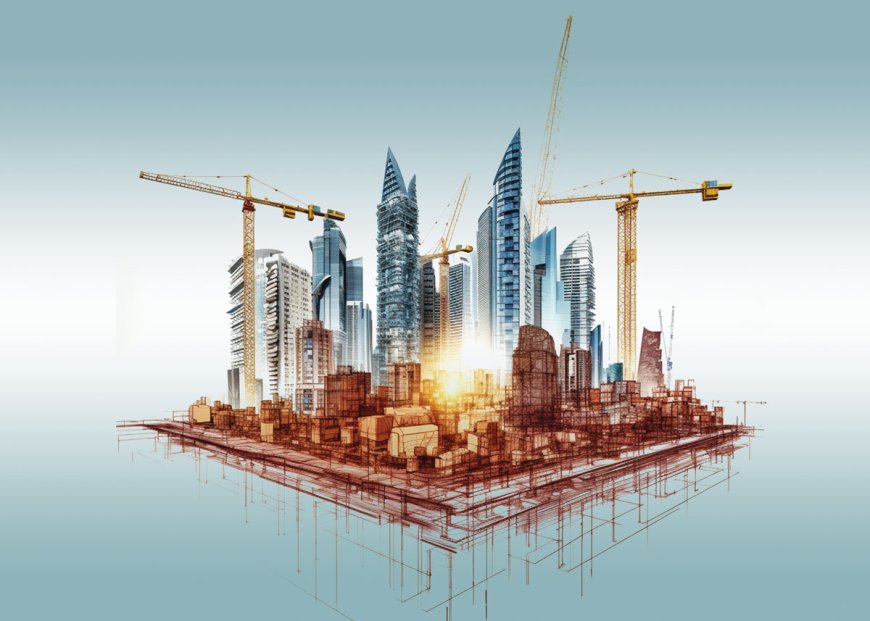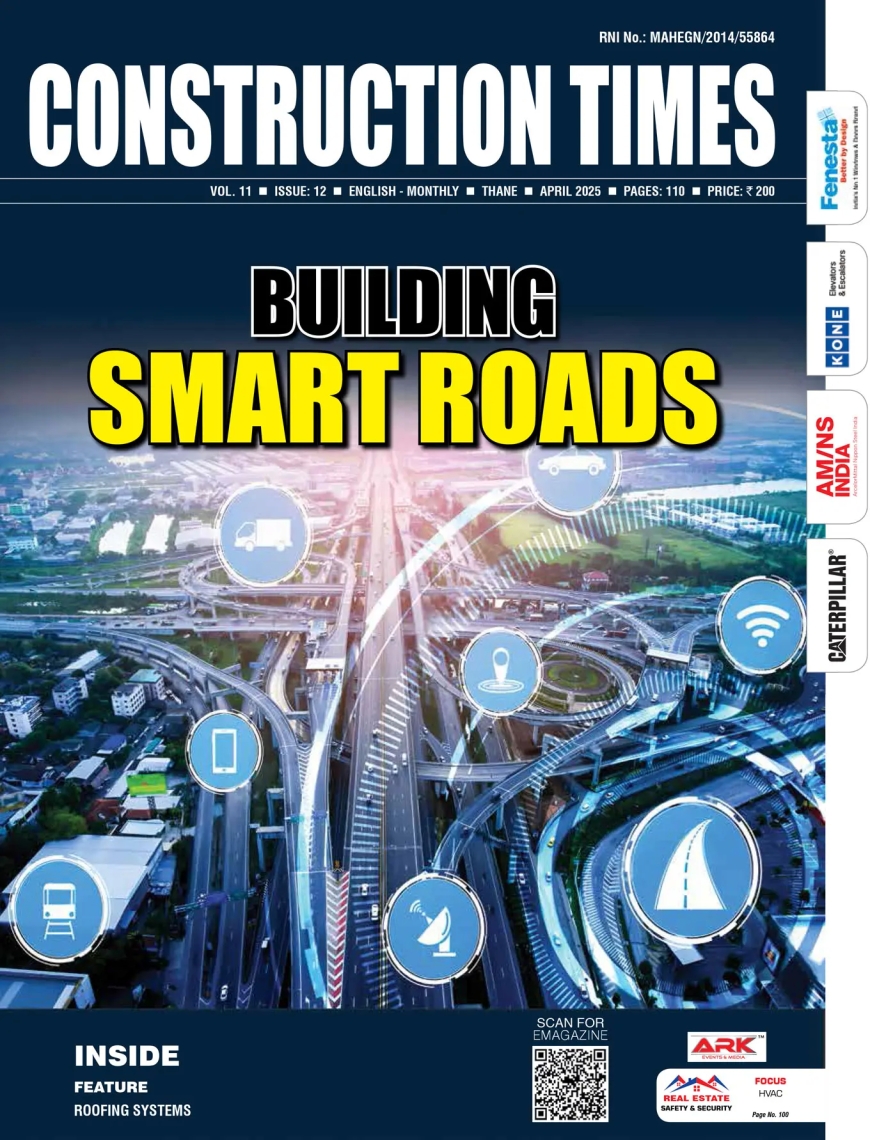On an upward curve

Construction projects in India are poised for a massive growth with rapid urbanization and growing population. In this scenario, Construction Times explores the role of construction technologies and how they will play a crucial role in India’s infrastructure growth.
The Indian construction industry is growing leaps and bounds and is expected to reach $1.4 trillion by 2025, according to Invest India. A Research and Markets report says that in 2024-2027, the sector's average annual growth is anticipated at 5.9%. Infrastructure projects lead the way, with a remarkable project pipeline managed by the Infrastructure and Project Monitoring Division showcasing substantial investment projections. Indian real estate market aims to reach $1 trillion by 2030 as the country is all set to become the third-largest construction market globally. In this scenario, the use of advanced technologies has become a priority today for the construction players.
Emerging trends in technology adoption
Use of new-age technologies has significantly gone up in India construction industry in the recent times. Project design, monitoring and execution in an efficient and foolproof way has been enabled by these technologies, especially when the projects are going bigger and complex.
The adoption of digital tools like Building Information Modeling (BIM), which has seen an increase in usage in the past two years, is enabling more accurate planning and execution of projects. Drones and IoT devices are improving site surveys and monitoring, contributing to reduction in project timelines and decrease in waste materials, aligning with sustainability goals.

“BIM facilitates collaboration among architects, engineers, contractors, and clients, allowing for better coordination, clash detection, and visualization throughout the project lifecycle. This integration translates into a notable reduction in errors, minimized rework, and improved adherence to project timelines,” highlights Harsh Pareek, Regional Sales Director, India and SAARC, Trimble Solutions. According to him, the integration of innovative construction methods like modular construction and prefabrication, facilitated by construction technologies, accelerates project timelines while maintaining stringent quality standards.
Overall, the evolution of digital technologies has transformed how construction projects are planned, executed, and managed, driving efficiency, productivity, and sustainability in the construction industry.
New-age solutions

Though the IoT-based technologies and AR/VR-based solutions have fast tracked the construction activities, the advent of digital technologies in the construction business initially started on a small scale, primarily in new and existing projects. Post COVID, the adoption of digital technologies has seen a rapid evolution in construction projects. “We are seeing an increased demand for use of technologies such as BIM, drones for aerial imaging, increasing popularity of AI/ML, cloud collaboration, AR/VR, robotics, and automation to enhance efficiency and productivity with a renewed focus on sustainability,” says Gary Wong, Global Industry Principal, Infrastructure and Water, AVEVA. According to him, leading owner-operators, EPCs, and construction companies have implemented process and technology step-changes in their execution of large construction projects, which have now been recognized and adopted as industry best practices.
Data driven approach is making a significant headway in today’s construction scenario. As Wong explains, “Today, a data-driven approach is the key to successful project execution with three focus areas: integrated project delivery, advanced work packaging, and effective contracting. These data-driven approaches are supported by emerging technologies such as AI, AR/VR and digital twin to derive value-creation across the entire ecosystem.”

Artificial Intelligence (AI) is redefining the construction industry, propelling it into a new era of efficiency and innovation. As Prasoon Shrivastava
Cloud computing and mobile applications have facilitated remote project management and seamless data exchange, fostering collaboration among dispersed teams and stakeholders.
Dedicated digital solutions
Construction projects vary in types and sizes while many projects have tight execution timelines. Various digital technologies and solutions are being used according to the project requirements. Leading technology players offer multiple solutions to meet the needs of project developers and contractors. According to Wong, AVEVA has digital software solutions to design, build, operate, maintain, and optimize new and existing projects. These solutions include 3D modelling, project execution, simulation, augmented reality, controls/automation, real-time situational awareness, AI/analytics, and hybrid cloud.
Trimble offers a comprehensive range of dedicated digital and software solutions tailored to various types of construction projects, catering to the diverse needs and requirements of construction firms. For large-scale infrastructure projects, Trimble Connect serves as a powerful collaboration platform, while Trimble SketchUp provides intuitive 3D modeling software, enabling architects and designers to create detailed and accurate designs. Trimble's ProjectSight software streamlines project management tasks, while Trimble's SiteVision augmented reality platform allows stakeholders to visualize proposed designs on-site. Trimble's Viewpoint software is designed specifically for construction accounting and project management. In building construction, Trimble offers solutions like Tekla Structures, specifically designed for structural engineering and detailing.
Zepth stands out as a uniquely scalable solution, adept at managing construction projects of any size, thanks to its Common Data Environment. In this platform, regardless of a project's scale, all stakeholders have access to a unified, secure platform for storing, managing, and sharing critical project data. “Zepth's pioneering AI features, including Zepth Co-pilot, AI Risk Manager, Docu Chat and advanced analytics, offer insights and automated oversight, further enhancing the platform's adaptability. These features not only streamline project workflows but also proactively address potential challenges, ensuring projects stay on track and within budget,” Shrivastava elaborates.
Bright future for construction technologies
Shrivastava sees the future of construction technologies in India bright and poised for rapid growth, reflecting a broader global trend towards digitalization. According to Wong, construction projects in India itself are poised for massive growth with rapid urbanization and growing population. Therefore, demand for digital technologies in this sector will continue to be on an upward curve. Pareek also anticipates a significant and sustained increase in demand for construction technologies in the future.







